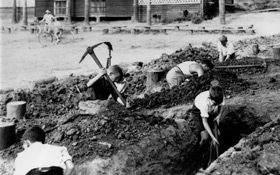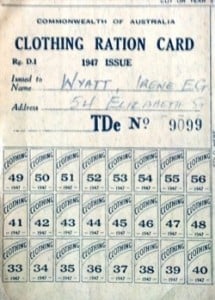As part of the Oral History course, I interviewed my Aunty Margaret, my mother’s sister. I recorded on my iPad then edited using the Wavepad program on my PC.
We had to submit a three minute recording with a transcript – I received a score of 88% but was mentioned I should use more ellipses … when the voice trails off in the recording.
Here is the actual edited recording and the transcript.
Interviewee: Margaret Phillips [MP]
Interviewer: Suzanne Wyatt [SW]
Date: November 16, 2016
Place: Her lounge room in West Moonah.
As Margaret is nearly blind, I read the information and consent forms to her. The interview is solely for family history purposes.
This starts at 16 seconds in on the audio file.
SW: Marg, do you give verbal consent for me to interview and record your responses?
MP: I do.
SW: What’s your full name, your date
MP: Marg
SW: of birth and your present address?
MP: Margaret Grace Phillips or do would you want England?
SW: No, that’s OK.
MP: 7/4/28 I was born. Unit 3/17 Sawyer Avenue, West Moonah.
Three minute interview starts here 00:31
SW: So how would you best describe your father? I’ve got some photos here in front of you. One here, they’re in a running race, and
(Both speaking at the same time)
MP: that was the city
SW: there are some birds
MP: That was the City Council, they the City Council had a picnic day once a year and this was down at Long Beach, just round about where the uh roundabout is [pause] I think the roundabout down there now isn’t there? Well that’s where it was, round about that area.
SW: So how did he go in the races? Was he a good runner?
MP: Yes, he was.
(Both speaking at the same time)
SW: and
MP: He won that if I’m not mistaken.
SW: Oh right.
MP: He got, he got some little thing.
SW: Oh it might be mentioned in the newspaper. I’ll be able to look it up.
MP: He uh always wore his watch with the chain on it, the fob watch. He always had that on where every where you wore a collar and tie.
SW: And some of these these other photos, he’s there with some birds. Is that in your back yard at
MP: Yes we had pigeon, pigeon loft and dad’d get the pigeons out and I would run up to Fitzroy Gardens and stand in a special place. I’ve let the pigeons go and dad would see who got home first, me or the pigeons. That was re about a weekly [pause] weekly um thing that he did. Yep.
SW: Oh right. And there’s another one there of. It looks like you and my mum and your dad in a rowboat.
MP: This one?
SW: Mmm.
MP: That
SW: Yeah.
MP: That’s dad and yeah Phyllis is in the middle and me on the end. That’ll be, I reckon, about the first time I went out in it.
SW: So did your dad go out rowing often?
MP: Oh, every weekend he went down to Sandy Bay baths to fish. And he had a little fish, he had a little uh what do you call’em now? Over the boat’s um [long pause] He was known. When you went to Long Beach on the trams, us kids would all go upstairs on the double decker tram and when we got to Wrest Point, “There’s Uncle Harry out there!” Everybody knew dad.
SW: Right
MP: And um he used to tell us. I was only telling someone the other day. He always took a little bottle of water. He couldn’t swim and he never had a life jacket or anything in the boat. He took a little bottle of water with him every time and when the fish started to bite, he’d go round like that [fading voice as she turns to the side] to some …[inaudible] to come back, he’d just put, “I’ve just put the oil of catchem in the water,” he said. And that’s how they caught their fish. But dad with his oil of catchem. They never ever woke up to it. When we went on the trams down they’d say, “Uncle Harry, Uncle Harry!” and everybody would wave. He was well known in Sandy Bay.
……………………………………….
Readers: Have you ever formally interviewed a relative? What was the most difficult part of the interview?

